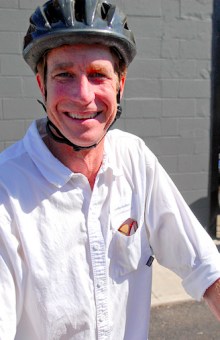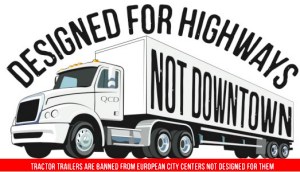
Committee, Corky Collier.
(Photo © J. Maus/BikePortland)
Not surprisingly, the death of Kathryn Rickson while she rode in a bike lane just one block from Portland City Hall has got a lot of people talking. Apart from the grieving we do as a community when something like this happens, many people are turning their feelings toward finding a solution to the problems they feel might have led to the collision.
Two major strains of discussion have emerged: large trucks and the safety issues they pose in tight, urban environments; and how we design bicycle access into our roads. Today I want to focus on the issue of truck safety (I am not dismissing the bikeway design issue; but it’s worth noting that we covered that at length following a similar fatality back in October 2007).
To get a better understanding about freight movement and truck safety downtown, I got in touch with Corky Collier. Collier is the former chair of the Portland Freight Committee, which is an advisory group to the Bureau of Transportation (think of it as the Bicycle Advisory Committee, but for freight). Collier is also the executive director of the Columbia Corridor Association, a non-profit business association that represents industries along the Columbia River.
“Eliminating trucks from downtown is no more useful an idea than asking all bike riders to walk through downtown. Both solve the problem, but create others.”
— Corky Collier, former chair of the Portland Freight Committee
I shared with Collier that some people in the community are questioning whether trucks with large, articulated trailers — like the 43-foot long truck that ran over Kathryn Rickson — should even be allowed downtown. Others (including the Bicycle Transportation Alliance) have called for making side under-run guards mandatory on all large trucks.
Collier feels that responding to this tragedy by immediately calling for a ban on trucks or mandatory safety equipment is an argument based more on emotion than reality. He’s not against having those conversations; but he feels they are more complicated than most people realize, and that they should be had only after the raw emotion has passed:
“We need to look at the issues as objectively as possible. You mentioned restricting larger trucks. I’ve also discussed the idea of side bumper guards. Neither would have helped in this case. But those discussions should continue with intellectual honesty. Those [issues] get to be much more complicated than most people think about. I prefer to give ourselves a little bit of time after an accident so that we’re approaching these not so much from an emotional perspective. Eliminating trucks from downtown is no more useful an idea than asking all bike riders to walk through downtown. Both solve the problem, but create others.”

after last week’s collision.
(© Ethan Jewett)
I asked Collier if he feels downtown would be a safer place if only small trucks were allowed. (According to PBOT spokesperson Cheryl Kuck, there are no general restrictions on the sizes of trucks allowed in downtown Portland, although some companies and receivers do night-time and off-peak hour deliveries to reduce congestion and conflict on the road.)
“I’m not sure about that. It’s a really good question to ask, and part of the answer needs to come from the bicyclists since they’re the ones staring at the tires. It’s somewhat complicated. If you’re talking about delivery vans, they’d probably be safer; but there’s only so much you can do with delivery vans… And there are other negative side effects.”
Collier points out that historically, the 43-foot length hasn’t been a problem. “Let’s say that trailer had been half the size, the accident still would have happened.”
The way Collier sees it, even if we did mandate smaller trucks, companies would simply need to put more of them on the roads to deliver the same amount of goods. And more trucks would be worse for the environment and might even be worse from a safety perspective, he says:
“We’re also trying to reduce greenhouse gas emissions. One of the best ways to do that is fill a large truck with cargo rather than use a lot of smaller trucks. Why would people be taking large trucks downtown if they’re not full? It’s inefficient. And if you had more trucks on the road, would you increase the dangers? That’s a real question to ask.”
Collier adds that a restriction on large trucks downtown would mean that companies would require some sort of central distribution node somewhere close to downtown. And wherever that was, we’d just be moving the safety concerns to a different location.
And what about the costs required to shift truck fleets to a smaller size? “Who’s going to pay for that?” Collier wonders, “Should that cost be shared? I wouldn’t want to turn to bicyclists and say, ‘You should change the bike you’re riding.'”
So, would local freight stakeholders even entertain a discussion about prohibiting large trucks? “I would enthusiastically jump into that discussion,” Collier said, but then added, “If it’s a conversation that looks at the big picture, and focuses on making Portland a better place to live. Absolutely.”
Same with mandating sidebars. Collier feels that, given what he knows about last week’s collision, they would not have made a difference in Rickson’s death, but nevertheless, he says, “It’s a good time to talk about them.”
Throughout our conversation Collier stressed the importance of education, for both riders and drivers. Back in September of 2008, the Portland Water Bureau hosted a bike/truck safety event. Collier wants to do another event like that somewhere downtown.
“I really wish we’d do a better job here of educating bicyclists, myself included,” Collier shared. He added that freight stakeholders generally prefer complete separation between bikes and trucks; but when that’s not possible, defensive riding and vigilance are paramount. “If you’re in a bike lane and passing a vehicle, going faster than them — warning signs should be going off in your head, you’re making yourself vulnerable to right hooks.”
In the end, Collier seems to just want to make sure the conversation about trucks and freight movement is fair and balanced. “One of the most frustrating things for me,” he said, “Is to talk to people that focus solely on the solution they want.”
Asked if he wanted to share any last thoughts with the community, Collier said, “The best thing we can do to honor Kathryn is to improve the safety for bicycle riders as well as for drivers… a lot of people are affected here… Let’s honor her by coming together, having these discussions, finding the best solutions we can come up with and educating ourselves on how we can drive and ride in a safer fashion.”

